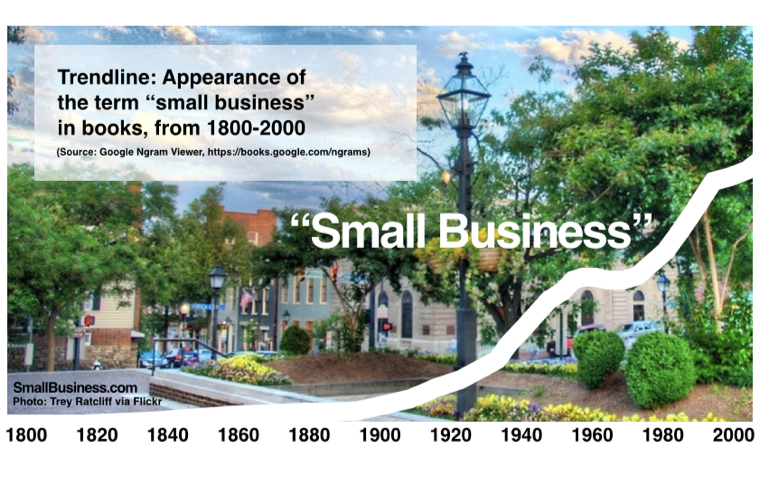
(Update: May 12, 2019)
In doing some fact-checking about presidents who started and ran small businesses, I was reminded how the term “small business” is not useful as a search term when looking for primary source material before the 20th century. To demonstrate what I mean, the trendline chart above tracks the appearance of the term “small business” in books published between 1880 and 2000.
Using Google’s Ngram Viewer, a tool that pulls such information from the Google Books‘ database of digitized books and publications, it’s easy to see that the phrase “small business” didn’t come into general use until the latter part of the 19th century. Usage of the term grew rapidly in two distinct time periods: (1) From 1920–1940 and (2) From 1970 until the present.
While neither a linguist nor historian, I’m familiar with (and even professionally attached to) enough American history and the term “small business” to suggest the journey of the term’s popularity.
1. Before the industrial revolution, all business was small business.
The American Civil War and the innovations of the second half of the 19th century ushered in the beginnings of a form of market-driven big business we’d recognize today. (Big business existed earlier, but forced labor and ownership by kings is not exactly the business paradigm to which I’m referring.) The notion of there being such a thing as a “small” business wasn’t necessary until there emerged the notion of a “big” business.
2. The cultural changes of the Roaring ’20s and Great Depression.
The notion of business as “big” and “small” fits into cultural and social shifts of the 1920s and 1930s, a period that saw a pendulum swing from economic boom to bust back to boom. The emergence of the middle class, organized labor and the golden age of Main Street commerce raised the country’s collective awareness that businesses came in two sizes, big and small. While the Great Depression wasn’t good for big business, it did wonders for big government.
3. The Post-war “Pejorative Era” of the term “Small Business.”
After World War II (won in America’s big and small factories, as well as on the battlefield, sky and sea), several social and cultural trends, economic events and the emergence of TV as the dominant medium combined to give many Americans a near religious-like belief in all things big: big government, big business, big media, even big hair. Is it a coincidence that this period of America’s emergence as the world’s dominant economic power would see a 20-year flatline in the growth of the usage of the term “small business”?
While it may be merely a coincidence of history, here’s some anecdotal (and today, quite ironic) evidence of the temporary dip in popularity of the term “small business”: In 1943, C. Wilson Harder created the National Federation of Small Business. In 1949, the organization changed its name to the National Federation of Independent Business. In hindsight, the name change seems impossible to imagine–unless understood in the context of that era’s connotation of “small business.” Today, the organization primarily uses its initials, NFIB, as its brand (in part, to avoid having to explain what “independent” means) and describes itself as “America’s leading small-business advocacy association.”
4. The era of the rugged individual who drives the engine of America’s economic growth.
Today, the term “small business” captures the essence of an American dream that evokes personal independence, risk and reward, and doing well by doing good. Supported by billions of dollars in advertising in which giant corporations have used the term “small business” in a celebratory way (the pinnacle of which is American Express’ Small Business Saturday promotion), it is no surprise that a Pew Research study shows Americans trust small businesses as much as they love Mom and apple pie, while they trust Congress just a little less than they trust corporations, which is not at all.
Disclosure:
Obviously, I’m biased. The name of this site is SmallBusiness.com.
Based on the history displayed in the chart above and my personal preference, I like the term “small business” and celebrate what it stands for every way I can. But I am in no way anti-big business. Hammock Inc. (the one that operates SmallBusiness.com, along with many other things) works extensively with clients who are very large corporations, so I’m clearly not anti-big.
Even if the name of this site wasn’t SmallBusiness.com, I’d still encourage marketers who want to reach an audience of owners and managers of companies that aren’t “big” (pick any number of employees less than 500) to be aware of the upward trending history of the term “small business.”
Realize you’re sailing into gale-force winds if you forget that terms like “middle-sized business” or “micro-business” (the acronym that only marketers understand — SMB — are ok for inside-the-company strategy sessions, but they are terms that have little or no awareness among the audience you are trying to reach.
The term “small business” isn’t broken. Try to rebrand it and you’re up against 150 years of history.
(The featured graphic includes a photo by Trey Ratcliff via Flickr)
